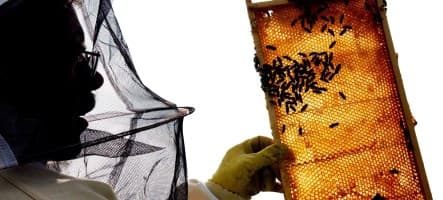German bees hit the road to avoid genetically manipulated pollen

Bee-keepers in Germany are increasingly taking their buzzing charges on long commuter journeys to the pollen fields – in order to avoid genetically-manipulated (GM) corn which can contaminate honey.
The GM pollen collected by bees from GM corn makes the honey too GM for human consumption, and thus impossible to sell, with big fines and even prison sentences for those who break the rules.
Karl-Heinz Bablok, apiarist in Kaisheim, Bavaria, is getting his bees used to travelling to work after a verdict in the Augsburg administrative court which confirmed that bee-keepers were responsible for keeping their insects out of GM fields.
“I could get up to three years in prison,” Bablok told a journalist from news agency DDP, referring to the penalties for people found selling honey for human consumption with more than four percent GM content.
Manfred Hederer, president of the German Professional Imker Association (DBIB) explained that shops will not take honey that does not come with a signed paper to say it is under four percent GM.
Testing costs around €300 per 10 kilo pot, making it easier to drive bees away from GM crops than get every pot tested.
Bablok drives his bees more than 10 kilometres and sets them up with hives there, so they are unlikely to collect GM pollen. But this is expensive. “Apart from anything else, I need new housing for them, which can sit outside in the open," Bablok said. "Each one of these costs around €100 and I need 17 of them.”
He said the travel to check them, which he needs to do at least four times a week, also mounts up.
Bablok said many apiarists in the region had already given up their businesses, either due to the costs or because their bees had died off. “Whether there is a connection to the GM fields or not I cannot say, I am not a scientist,” he said.
Heike Moldenhauer, GM expert at the nature protection group BUND, suggested the apiarists start putting on commercial pressure to make their problems more widely appreciated.
She said, “If the bees are no longer available for pollination, there will, for example, be no more fruit or grain.”
Comments
See Also
The GM pollen collected by bees from GM corn makes the honey too GM for human consumption, and thus impossible to sell, with big fines and even prison sentences for those who break the rules.
Karl-Heinz Bablok, apiarist in Kaisheim, Bavaria, is getting his bees used to travelling to work after a verdict in the Augsburg administrative court which confirmed that bee-keepers were responsible for keeping their insects out of GM fields.
“I could get up to three years in prison,” Bablok told a journalist from news agency DDP, referring to the penalties for people found selling honey for human consumption with more than four percent GM content.
Manfred Hederer, president of the German Professional Imker Association (DBIB) explained that shops will not take honey that does not come with a signed paper to say it is under four percent GM.
Testing costs around €300 per 10 kilo pot, making it easier to drive bees away from GM crops than get every pot tested.
Bablok drives his bees more than 10 kilometres and sets them up with hives there, so they are unlikely to collect GM pollen. But this is expensive. “Apart from anything else, I need new housing for them, which can sit outside in the open," Bablok said. "Each one of these costs around €100 and I need 17 of them.”
He said the travel to check them, which he needs to do at least four times a week, also mounts up.
Bablok said many apiarists in the region had already given up their businesses, either due to the costs or because their bees had died off. “Whether there is a connection to the GM fields or not I cannot say, I am not a scientist,” he said.
Heike Moldenhauer, GM expert at the nature protection group BUND, suggested the apiarists start putting on commercial pressure to make their problems more widely appreciated.
She said, “If the bees are no longer available for pollination, there will, for example, be no more fruit or grain.”
Join the conversation in our comments section below. Share your own views and experience and if you have a question or suggestion for our journalists then email us at [email protected].
Please keep comments civil, constructive and on topic – and make sure to read our terms of use before getting involved.
Please log in here to leave a comment.